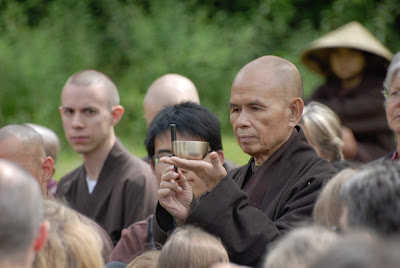Try to notice when you fall into the mode of “waiting for something to happen.” Note that if you are “waiting for something to happen,” you are not really present, but fixated, sometimes even obsessed with some future occurrence. Note how your “center” is not presence, but some hoped for, or dreaded, upcoming event.
Living in anticipation of the future, constantly returning to the thing that’s going to happen, you have no present, no presence, but live as kind of ghost who is projecting presence into something that may or may not happen in the future. So, just make note of that: “Waiting for something to happen,” and then return to your breath, to the present moment. What shows up when you do that, when you return to the now? What is really going on, right now, right here? Whatever it is, that’s what needs your attention.
But what if what's going on right now is my anticipating or worrying about something that’s going to happen! Ok, good! That’s good to know! Just realizing that, and not being lost in that, means you’ve come back home, even if just for a moment! So, pay attention to that worry or anticipation, by not by being lost in the anticipation, or worry, but by coming back to the breath, to presence and really looking into the anticipation, or the worry. What is that? Don’t beat yourself up! Just note what it is. And return to the breath, and presence.
What you are anticipating might be a “big happy,” something you are really looking forward to. Well, good! Note that: “I am really feeling happy about what’s coming! I can hardly wait!” Great! Know and feel that you can hardly wait, and then come back to your breath, your anchor, and presence.
Or your “waiting for something to happen” mode might be dread about some upcoming event. Well, then it’s good to see and know that! Note: I am really feeling worried about that phone call I have to make, that doctor’s appointment, that report I have to hand in.” Whatever it is, just note: “I am feeling really worried, nervous, afraid about what’s coming. I am dreading it.” And then, stopping the “runaway train” by paying real attention to it, come back to the breath and feel the solid groundedness of the breath in the body. Be kind and reassure yourself: I am more than my thoughts and feelings. I choose to be authentically present with whatever shows up.
Repeat as necessary, and with each return the the breath and presence, relax your face, your body, and smile to yourself and perhaps say: “I am here. I am present. I am solid in my breath.” And then return to whatever it is you need to be doing at the moment, but with a sense of paying attention. You may feel yourself slipping into “waiting for something to happen” mode or you may suddenly wake up and realize you’ve been in it for a while without even realizing it. We all do that! Well, just realize that — I’m in “waiting for something to happen mode.” Relax, smile to yourself, and return to the breath. Repeat as necessary, cultivating patience and compassion for yourself as you come to understand your “stuck” places.
Remember, you are not “waiting for something to happen.” You are presence itself. The big show is you, not what’s going to happen! As we settle into our presence, then these thoughts and feelings can come and go like clouds in the sky. We see them, we recognize them — hey, that’s a cumulus cloud, i.e., hey, that’s a big worry, or a big joy — but we don’t cling to them or self-identify with them. We don’t drift off with them into unconsciousness and wake up miles from home in strange territory. Or if we do - lol! — and we all do! — we simply come back to the breath, and remember that we are the sky, not the clouds.
As we grow in skill and confidence in being present, we can then enjoy the sky show without harm and with more innocence and freedom from suffering. No longer “waiting for something to happen,” we are what is happening, and mindful presence always unbinds us and sets us free!
Steven Goodheart
♡♡♡








































